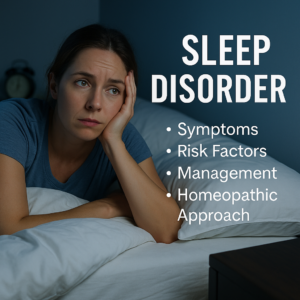Understanding Sleep Disorders and Remedies

Sleep is essential to our mental, emotional, and physical well-being. But for millions of people worldwide, restful sleep is elusive. Sleep disorders can significantly impact quality of life, productivity, and overall health. Whether you’re struggling to fall asleep, waking up multiple times during the night, or feeling exhausted despite getting hours in bed—you’re not alone.
In this post, we’ll explore the key aspects of sleep disorders: their symptoms, risk factors, management, and treatment options, including an in-depth look at the homeopathic approach.
💤 What is a Sleep Disorder?
A sleep disorder is a condition that regularly affects your ability to get enough quality sleep. While occasional sleep troubles are normal, persistent issues may point to an underlying disorder that needs attention.
⚠️ Common Types of Sleep Disorders
-
Insomnia – Difficulty falling or staying asleep
-
Sleep Apnea – Breathing interruptions during sleep
-
Restless Legs Syndrome (RLS) – Urge to move legs, especially at night
-
Narcolepsy – Sudden sleep attacks during the day
-
Circadian Rhythm Disorders – Disrupted sleep-wake cycles due to shift work or jet lag
📝 Symptoms of Sleep Disorders
-
Difficulty falling asleep or staying asleep
-
Excessive daytime sleepiness or fatigue
-
Loud snoring or gasping for air during sleep
-
Mood swings, irritability, or depression
-
Trouble concentrating or memory problems
-
Morning headaches or dry mouth
-
Unrefreshing sleep even after long hours
🧬 Risk Factors
Several factors can contribute to the development of sleep disorders:
-
Chronic stress or anxiety
-
Mental health conditions (depression, PTSD)
-
Medical conditions (asthma, GERD, chronic pain)
-
Medications that interfere with sleep
-
Poor sleep habits or irregular schedules
-
Substance use (caffeine, alcohol, or recreational drugs)
-
Age and genetics
🛠️ Management and Lifestyle Strategies
Before jumping to medication, many sleep disorders can be managed by improving sleep hygiene and adopting healthy habits:
-
Stick to a regular sleep schedule, even on weekends
-
Create a calming bedtime routine (reading, warm bath, meditation)
-
Limit screen exposure and blue light before bed
-
Avoid heavy meals, alcohol, or caffeine close to bedtime
-
Exercise regularly but not too close to bedtime
-
Make your bedroom sleep-friendly – cool, dark, and quiet
💊 Conventional Treatment Options
Treatment depends on the specific disorder and its severity:
-
Cognitive Behavioral Therapy for Insomnia (CBT-I)
-
Prescription sleep aids (used short-term under medical supervision)
-
CPAP machines for sleep apnea
-
Iron supplements for RLS
-
Light therapy for circadian rhythm disorders
While effective, some of these treatments may come with side effects or may not be sustainable long-term. That’s where natural and homeopathic remedies can play a supportive role.
🌿 The Homeopathic Approach to Sleep Disorders
Homeopathy offers a gentle, holistic approach to restoring sleep. Based on the principle of “like cures like,” homeopathy aims to stimulate the body’s own healing ability, treating both the symptom and the root cause.
✨ Key Homeopathic Remedies for Sleep Issues
Note: Homeopathic remedies are best chosen based on individual symptoms. It’s recommended to consult a certified homeopath for personalized treatment.
1. Coffea Cruda
-
For racing thoughts, overexcitement, or sleeplessness due to joy or anticipation
-
Mind stays hyperactive even when the body is tired
2. Nux Vomica
-
For sleep disturbances caused by overwork, stress, stimulants, or alcohol
-
Person wakes at 3–4 a.m., irritable and unable to return to sleep
3. Arsenicum Album
-
For those with anxiety, restlessness, and fear, especially at night
-
Frequently wakes and finds it hard to fall asleep again
4. Lycopodium
-
For disturbed sleep from digestive issues, worry, or overthinking
-
Trouble sleeping in the second half of the night
5. Gelsemium
-
For sleep troubles due to anticipatory anxiety or exam stress
-
Includes drowsiness, but difficulty falling into deep sleep
6. Sulphur
-
For restless sleep with frequent waking, vivid dreams, and night sweats
-
Feeling hot and needing to uncover while sleeping
💡 Why Choose Homeopathy?
-
Non-addictive and safe for long-term use
-
Personalized treatment tailored to physical, emotional, and mental symptoms
-
Can be used alongside conventional treatments under guidance
-
Supports overall emotional balance and immune function
🌙 Final Thoughts
Sleep is one of the most powerful natural healers we have. When disrupted, it affects every part of our lives—from mood and memory to immunity and relationships. Whether your sleep issues are due to stress, anxiety, physical discomfort, or lifestyle factors, there is hope.
By combining healthy sleep habits, professional support, and natural approaches like homeopathy, you can begin to reclaim restful, restorative sleep—night after night.
Have questions about using homeopathy for your sleep concerns? Drop them in the comments or book a consult with a qualified homeopathic practitioner to get started on your journey to better sleep—naturally.
See Also:
